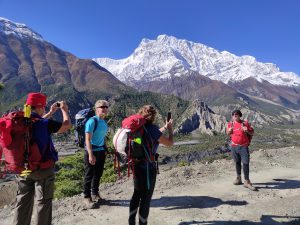
Historically, Nepal’s foreign policy has been actively pivoted by various changes and continuity. Disaster and reconstruction, diffusion of power, the rise of new regional players and non-state actors, global financial crises, increasing fiscal constraints, and the explosion of new technologies are some of the external catalysts for change while promoting national interests have always been on the continuum and the staple core of our foreign policy.
With its unique geopolitical location, Nepal has challenges and opportunities for its diplomacy in the 21st century. The country still grapples with a transitional phase, sluggish economic development, and political instability and faces several challenges that are intricately tied to its diplomatic endeavours.
Regional role

With the global economic epicentre shifting towards Asia, the 21st century is touted as the ‘Asian Century’. Our northern neighbour, China, is the world’s second-largest economy, and S&P Global Ratings has reported that India has set its course to become the third-largest economy in the world by 2030. Another key player is Japan, characterised by its economic prowess, regional stability, technological leadership, and active diplomatic engagement with Asian neighbours and other countries. Nepal’s strategic location among economic juggernauts, especially at a critical juncture when Asia is emerging as a global superpower, testifies to her significance in the region.
Being the only point of convergence between them, Nepal’s seamless connectivity to both nations lands it in a favourable position in security, geopolitics, trade, and economy. Further, the escalation of the Sino-Indian rivalry and the emergence of the Quadrilateral Security Dialogue (Quad), Japan’s alliance with the USA to counterbalance Chinese forces as well as steady grants to Nepal to exert its influence establish the fact that Nepal can no longer afford to remain a buffer state.
As a landlocked nation surrounded by formidable economies on all sides, Nepal is presented with what we may call the ‘Sword of Damocles’. The challenge lies in leveraging its position to gain economic benefits while avoiding becoming inactive while its two neighbours wrestle to exert their respective influence. Hence, the prevailing policy of playing one force against the other should be chucked out to adopt a more pragmatic and prudent foreign policy.
Nepal can no longer be restricted to being a passive pawn in this global chessboard game with international players. She is the key to unlocking the Asian powers as well as strategically manoeuvring the future of Asia and the world. Through sensible statecraft, we should not only pivot relations with our neighbours but possibly reinvent this region. Using soft power resources that enable plenty of opportunities, Nepal should cement a decisive role while simultaneously achieving national interests.
Role in the international community
As China ushered in an epochal shift in world trade, production, and consumption patterns, this so-called “World’s Factory” is leading the West to rethink its economy. With the promulgation of ‘Bidenomics’, the Investing in America agenda, and the Inflation Reduction Act, 2022, in the USA, a new international economic system is on the brink, with global trends in trade likely to converge inwards.
The current economic system is churning between the USA and Sino-Russian entente, leading to the much-anticipated New World Order. Coupled with the Global South’s new impetus for its vision and vocabulary of “New World Order,” it is markedly inevitable.
In addition to that, history stands as a testimony to the occupation of smaller nations by bigger ones. South Korea, Singapore, and Mongolia in the past and presently, the waging war between Russia-Ukraine, Israel-Palestine, and China-Taiwan are exemplary of irredentism and a ‘bigger state’ hegemony.
Under a cluster of recent developments, the landlocked and least developed countries are threatened directly and indirectly as they brace themselves for unprecedented changes. A trickle-down effect that runs deep from highly developed nations to developing and least developed nations jolts the latter, further impeding their peace and development processes. However, it is imperative to underline the pivotal position of smaller nations and their strategic location in regionalism, as well as to shape the ensuing New World Order.
As smaller nations, countries like Nepal have no choice but to accept the Order of the New World as it comes. Hence, we should opt for strategic autonomy by consciously diversifying foreign policy interactions. In other words, Nepal should strengthen its ties with smaller nations and unanimously voice for their protection. Altogether, we must work to find a new world order based on justice and democracy by building associations with similar nations upon the foundation of collective security and stability.
Since Nepal remains binocular for the West, Europe, and East Asia to sneak a peek into the affairs of Beijing and New Delhi, we are fertile ground for the analysis and assessment of the ground reality and superficial tactics of the Asian region on a minuscule scale. Thus catalyzing the country to forge a burgeoning interdependence on and protection thereof, which extends to all smaller nations with vital strategic locations. Thus, only when the stature of Nepal is made stable then the economic prosperity of the USA, Russia, China, Japan and all other developed nations be achieved. The co-creators of the New World Order should acknowledge our map coordinates and not undermine our size.
Under given circumstances, Nepal is in the right place at the right time. Nepal’s sovereignty and stability are of international interest, as they are crucial in preventing any direct conflict between its belligerent neighbours. Our land is also of special importance in terms of geopolitics and geostrategy for the international community as the vortex of the powerful Asian tri-junction area.
On an international level, our diplomatic ties should be furthered on the rationale of self-preservation and self-protection in association with other smaller nations. Regionally, Nepal should actively seek to diversify trade, attract infrastructure investments, consolidate economic relations, construct connectivity projects, and garner development and security cooperation with neighbouring countries guided not by equidistance but an equi-proximity policy.

























